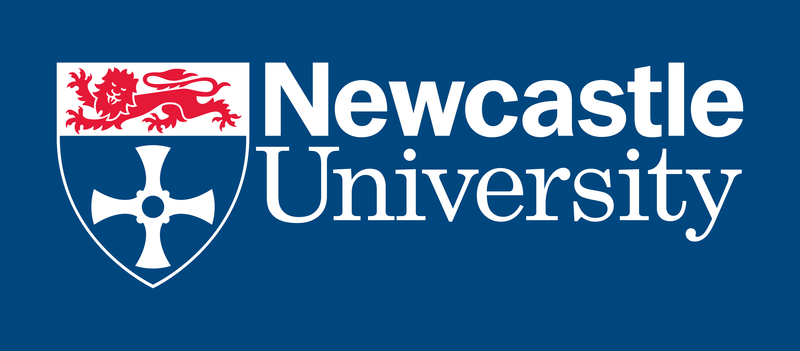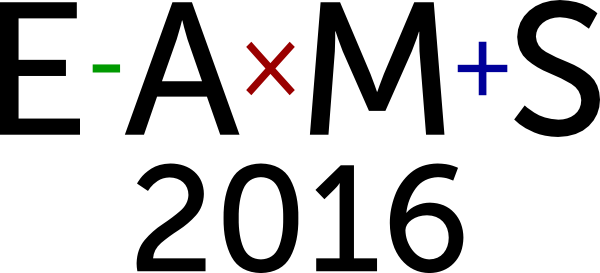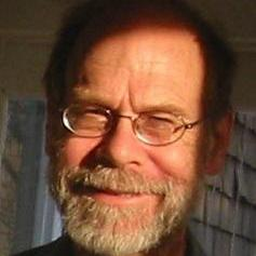Programme
Presentations and workshops at EAMS 2016Day 1
13 Sep 2016
09:15-10:00
Registration and refreshments
10:00-10:30
Herschel building foyer
Welcome to EAMS 2016
Registration and refreshments.
Keynote: The maths e-assessment experience
Usability should be considered at every stage of creating an assessment: the system used to access the question should be straightforward to use, and the questions themselves should be clear about... Read More
Flipping large modules!
Designing an instructional strategy for a module of 160 students so that lecture sessions can be more personally responsive is a challenging task. It is clearly impossible to give every... Read More
Using CAA to set grades in mathematics courses for engineering students in electronics
The aim of this talk is to show students’ working methods using CAA and performance, following the introduction of new teaching approaches and integrating mathematics within the programme for engineering... Read More
Using e-Assessment to support flipped–style teaching
We show how weekly formative e-Assessments are used to support flipped-style teaching of the Calculus & Numerical Methods module delivered to all first year Mathematics students at the University of... Read More
The SCHOLAR Programme in Scotland
Proponents of e-learning, aimed at independent learners or combined with blended learning, for students within secondary and tertiary education have relied on relatively small scale studies to advance their case.... Read More
12:30-13:30
Lunch
Keynote: The interplay between calculation and reasoning
Deductive reasoning and proof is one of the hallmarks of mathematics, and is an important factor in distinguishing mathematics from empirical sciences. Fluency in calculation, including symbolic manipulation in algebra and calculus, sit alongside... Read More
Using STACK at the Open University
In this presentation we will discuss the use of the STACK computer-algebra based e-assessment system at the Open University, in particular on two first level mathematics modules. We will discuss... Read More
Reflections on using Maple T.A. for summative assessment
Five years ago the Department of Mathematical Sciences at the University of Essex started using Maple T.A. for summative assessment in some of its Undergraduate modules. This commercially available software, which... Read More
The role of partially-automated assessment in assessing individual contribution to group projects
Group work is generally accompanied by concerns around whether all students are contributing equally or whether some are getting credit for work they didn’t do. Teaching and assessment of a... Read More
Numbas as an engagement tool for first-year business studies students
We have used Numbas as a tutorial and assessment tool for First Year Business Studies students in Cork Institute of Technology, Ireland for two years or in academic terms four... Read More
15:30-16:00
Break
Automatic marking of C code applied to mathematics problems
We demonstrate how we have used DEWIS to automatically assess programming skills, in particular, in the C programming language. DEWIS is fully algorithmic open-source e-Assessment system designed and developed at... Read More
Bin that rubric: A better way to assess conceptual understanding
Traditional examination practices are well-suited to assessing students’ knowledge of facts and application of procedures. Typical questions and marking rubrics focus on the precision and accuracy that are key to... Read More
Creating statistics e-Assessments using DEWIS with embedded R code
We demonstrate how to create statistics e-Assessments using the DEWIS system with embedded R code. DEWIS is a fully algorithmic open-source e-Assessment system designed and developed at the University of... Read More
SOWISO: towards an integrated computer learning environment for mathematics
The mathematical community has been enriched in the past decades with various computer programs that facilitate and improve teaching and learning of mathematics. Although many practical problems still exist, computer... Read More
MathJax – A Universal Rendering Solution for Mathematics
Mathematics support on the web is currently very limited; this is mainly due to the lack of browser support for the dedicated markup language MathML. MathJax is a JavaScript library that tries to... Read More
Day 2
14 Sep 2016
09:00-09:15
Start of Day 2
The e-Assessment Association
The e-Assessment Association (eAA) is a not-for-profit membership body with three major goals. To provide professional support and facilitate debate/discussion for everyone involved in this field of expertise; To create... Read More
Keynote: The WeBWorK on-line homework system and its academic community
On-line mathematics homework systems have been around for two decades (WeBWorK started in 1996). I’ll start with a very brief summary of what homework systems do, how they can be... Read More
Question design workshop and system demos
Do you want the chance to share experience and ideas in a practical session? We are all in search of ideas to get our teeth into, or people to help... Read More
11:30-12:00
Break
STACK with state
The question model of STACK provides an easy way for building automatically assessable questions with mathematical content, but it requires that the questions and their assessment logic depend only on... Read More
Development of math input interface for mobile devices
Online testing is useful for confirming students’ understanding of the learning subject; it has the advantage of instant feedback by automatic assessment, and students can practice by solving many online... Read More
Mathematica-based e-Learning/Assessment System for College Mathematics
The after-class learning is quite important to understand and master college mathematics. To build a learning environment which promotes students’ after-class learning, we developed the web site MATH ON WEB,... Read More
MATHTOUCH: Mathematical Input Interface in E-Assessment Systems
Shizuka Shirai and Tetsuo Fukui, Mukogawa Women’s University In recent years, e-assessment systems have been used for instruction to students in mathematical sciences education. However, text-based mathematical input interfaces of... Read More
13:00-14:00
Lunch
Three steps forward, two steps back: innovation and implementation of e-assessment in high stakes mathematics tests for 14-19 year olds
Three steps forward, two steps back: innovation and implementation of e-assessment in high stakes mathematics tests for 14-19 year olds In 2002, the Qualifications and Curriculum Authority hosted an international... Read More
Using STACK to Assess Information Transfer in Mathematics
A presentation of work carried out with co-author Reima Halmetoja. Rämö, Oinonen, and Vikberg (CERME 2015) define a category of mathematical assignment tasks called “Information transfer” by which they mean questions that... Read More
Proctoring to improve teaching practice
Digital assessment can improve efficacy of assessment especially in the large groups of students. On the other hand, when assessments are conducted on the internet, students can easily cheat. To... Read More
Using Numbas for online learning and e-assessment in a basic mathematical subject, a Norwegian approach
Digital sources and tools being used in teaching and dissemination of knowledge is getting better. Those elements gives new opportunities at the intersection of pedagogical and didactic challenges around building... Read More
Overcoming challenges with e-assessment implementation in developing countries: a case study from South Africa
Most of South Africa’s universities are currently under great pressure to increase their intake of students, although the average incoming student does not have an adequate mathematical background to understand... Read More
Ubbr: a Python/SageMath package for mathematical e-assessment
Ubbr is a Python/SageMath package for facilitating web based e-assessment. The motivation for developing this software is to take advantage of the popularity and accessibility of Python as a scripting... Read More
15:30-16:00
Break
Keynote: Whither e-assessment in the mathematical sciences: a critical view from the edge
Once upon a time, a very long time ago, I was a mathematics undergraduate. I switched to physics and I am now a physics education researcher; my mathematics is distinctly... Read More
17:00-17:30
LT1





























